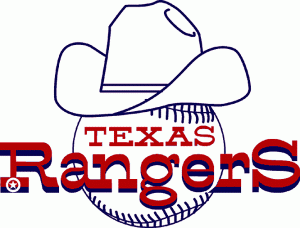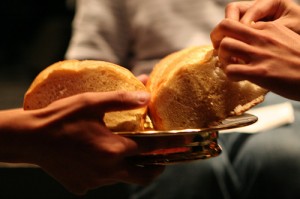 We’re seeing right now with the Rangers the exact same thing we saw at this point last season. They’ve smashed into the wall. They can’t hit, they can’t field, they can’t pitch. They’re flat. They’re done. And Oakland’s on a tear. The same thing happened last year at this exact same time. And we’re running out of options for turning things around. You can’t hold a players-only meeting every week. You can only call a special team meeting with the manager a couple of times a year. Now what? I wore my 1996 AL West Championship T-shirt to bed last night, trying to channel some of that magic from the first ever playoff year for the Rangers. We could use some of that Johnny Oates mojo, some of that Pudge Rodriguez intensity, some of that Will Clark leadership. We need something. This is the do-or-die weekend for Texas. If they don’t take at least two out of three from the A’s, beginning tomorrow, we’ll play Taps for the team here on Monday. Yuk.
We’re seeing right now with the Rangers the exact same thing we saw at this point last season. They’ve smashed into the wall. They can’t hit, they can’t field, they can’t pitch. They’re flat. They’re done. And Oakland’s on a tear. The same thing happened last year at this exact same time. And we’re running out of options for turning things around. You can’t hold a players-only meeting every week. You can only call a special team meeting with the manager a couple of times a year. Now what? I wore my 1996 AL West Championship T-shirt to bed last night, trying to channel some of that magic from the first ever playoff year for the Rangers. We could use some of that Johnny Oates mojo, some of that Pudge Rodriguez intensity, some of that Will Clark leadership. We need something. This is the do-or-die weekend for Texas. If they don’t take at least two out of three from the A’s, beginning tomorrow, we’ll play Taps for the team here on Monday. Yuk.
~~~~~~~~~~
“They ate and drank with great joy in the presence of the Lord.” ~1 Chronicles 29:22
 If put on the spot, most of us would not be able to quote anything out of Leviticus. Most of us have never participated in or even seen an animal sacrifice. And a decreasingly fewer number of us have ever slaughtered an animal to eat. Anything having to do with the sacrifices prescribed by God and practiced by his people in the Hebrew Scriptures is mostly ignored by us. That was Old Testament, we like to say. That was the Law of Moses. Those are complicated rules and regulations, outdated and ineffective means of obtaining forgiveness from which New Testament Christians have been freed. We don’t know much about these sacrifices because we don’t study them. Those sacrifices are not important for us today. They’re certainly not binding.
If put on the spot, most of us would not be able to quote anything out of Leviticus. Most of us have never participated in or even seen an animal sacrifice. And a decreasingly fewer number of us have ever slaughtered an animal to eat. Anything having to do with the sacrifices prescribed by God and practiced by his people in the Hebrew Scriptures is mostly ignored by us. That was Old Testament, we like to say. That was the Law of Moses. Those are complicated rules and regulations, outdated and ineffective means of obtaining forgiveness from which New Testament Christians have been freed. We don’t know much about these sacrifices because we don’t study them. Those sacrifices are not important for us today. They’re certainly not binding.
Not so fast.
When Paul is writing to the Corinthians about what is actually happening around the Lord’s Supper, he asks them to first understand what’s happening at the Israelites’ sacrifices.
“Consider the people of Israel: Do not those who eat the sacrifices participate in the altar?” ~1 Corinthians 10:18
Eat the sacrifices??? Most Christians today don’t realize that God’s people always ate the sacrifices. They made a community meal out of the meat. And Paul says this is significant for understanding the function of the Lord’s Supper. Paul doesn’t just talk about the Passover sacrifice and meal as informative, he mentions the entire sacrificial system. Paul reflects on the meaning of eating the sacrifice to help Christians better comprehend what’s happening at Christ’s table.
The fellowship offering was ordered to go alongside all sin offerings and burnt offerings. You can’t find a place in Scripture where God’s people didn’t offer the fellowship sacrifice in the course of observing the others. The word translated “fellowship,” or “peace” in some English versions, is actually shelem, from the shalom root that means “peace.” Shalom means peace, while shelem communicates a relationship of peace, a communion or fellowship between two parties. And fellowship sacrifices were always eaten together by the people. 
You find God’s people offering fellowship sacrifices at the ratification of the Mosaic covenant, at the inauguration of the priesthood, and as a part of every major festival, including Passover, Pentecost, and Tabernacles. Fellowship offerings and meals were required at the end of a Nazarite vow. Fellowship offerings were the climactic moments at the inaugurations of Israel’s kings, at covenant renewal ceremonies at Shechem and Jerusalem, at the dedication of the temple, and as part of the regular corporate worship of God. You have to read most of Leviticus and Deuteronomy to get it, but sacrifice and fellowship and communion meals were a normal part of life with God and with one another in this community of faith.
The way it worked was that the fat of the animals was left on the fire to burn, while the people ate the meat together as a community. It happened at the same time. God was consuming the fat on the fire, the people were consuming the meat on their plates. God and his people were sharing a meal together, eating at the same time, around the same table. Fellowship, shelem, with God and with one another. These fellowship meals always followed the sacrifice. And they were consistently characterized by two things: the presence of God and great joy.
Exodus 18:12 – Moses, Jethro, and Aaron eat the sacrifice “in the presence of God” to celebrate their salvation from Egypt.
Exodus 24:8-11 – “they saw God, and they ate and drank.”
Deuteronomy 12:4-7 – “Eat and rejoice in the presence of the Lord your God.”
Deuteronomy 12:17-18 – “Eat them before the presence of the Lord… rejoice before the Lord.”
Deuteronomy 14:23 – eat the grain and livestock offerings “in the presence of the Lord.”
Deuteronomy 14:26 – “Eat there in the presence of the Lord your God and rejoice.”
Deuteronomy 15:20 – regarding the first born animals of the flocks: “eat them in the presence of the Lord.”
1 Chronicles 29:21-22 – the people ate and drank with great joy in the presence of the Lord
Deuteronomy 27:7 – at the covenant renewal in Shechem; the people ate the fellowship offerings “rejoicing in the presence of the Lord.”
2 Chronicles 7:10 – at the building of the temple; people eating the fellowship offerings were “joyful and glad in heart.”
Ezra 6:13-22 – at the re-building of the temple; the people “celebrated with joy” because the Lord had “filled them with joy.”
Nehemiah 8:1-18 – at the re-building of the city walls; “do not mourn or weep… enjoy choice food and sweet drinks… the joy of the Lord… celebrate with great joy.”
Numbers 10:10 – “at your times of rejoicing, your appointed feasts.”
![]() I could fill up your screen with many more references. The point is that the covenant meals were always, without exception, eaten by and with the entire community, always in the presence of God, and always with great joy. The fellowship meal is a joy-filled celebration of the righteous relationship — the peace, the communion — with God that resulted from the sacrifice at the altar. You can’t find a community meal anywhere in the Old Testament in which joy was not the mood and celebration not the command. In fact, in the one place in which Israel was weeping during the meal, God rebuked them and corrected them, commanding them to “celebrate with great joy.”
I could fill up your screen with many more references. The point is that the covenant meals were always, without exception, eaten by and with the entire community, always in the presence of God, and always with great joy. The fellowship meal is a joy-filled celebration of the righteous relationship — the peace, the communion — with God that resulted from the sacrifice at the altar. You can’t find a community meal anywhere in the Old Testament in which joy was not the mood and celebration not the command. In fact, in the one place in which Israel was weeping during the meal, God rebuked them and corrected them, commanding them to “celebrate with great joy.”
Fellowship meals in the Old Testament were never intended to be moments of solemn silence or private introspection. Communion meals were not in any way individualistic. They were interactive, participatory meals in which the entire community actively engaged with one another and with God. The meals were joyful and grateful celebrations of the blessings of God. This is the understanding and the practice of Jesus himself, his disciples, and all the New Testament writers. Not just them, but their grandfathers and great-great-great-great grandfathers before them.
Paul says if you understand this, you can better understand the Lord’s Supper. As an expression of peace and communion between God and his people. As a communal act shared among the people of God. As a salvation celebration characterized by great joy and thanksgiving. Do our Lord’s Supper practices and experiences today reflect this understanding?
Someone in our class last night asked, “Why don’t we do the Lord’s Supper this way? Why do we look at the floor and get so quiet during the Lord’s Supper?”
Good question.
Shalom,
Allan
Leave a Reply